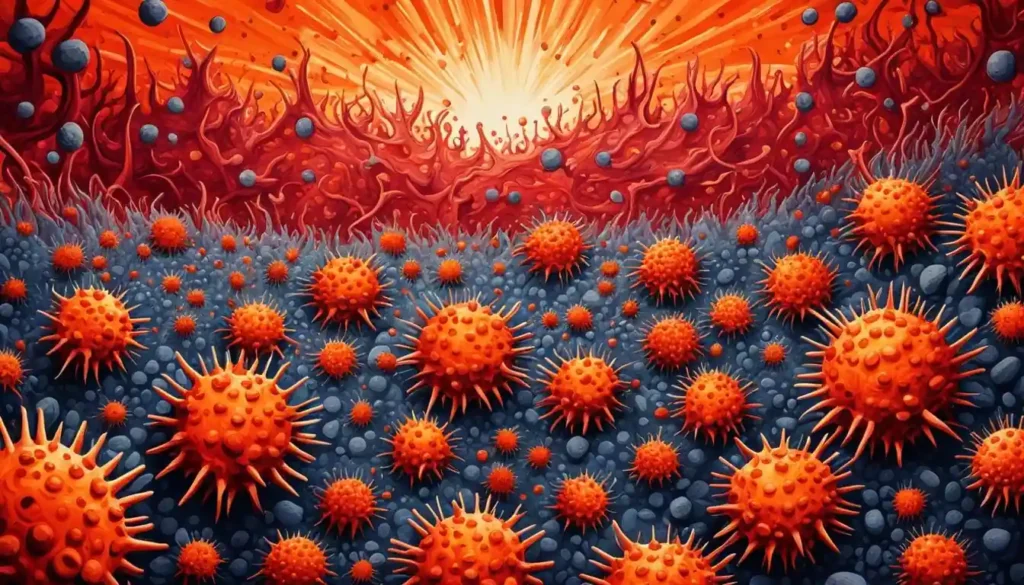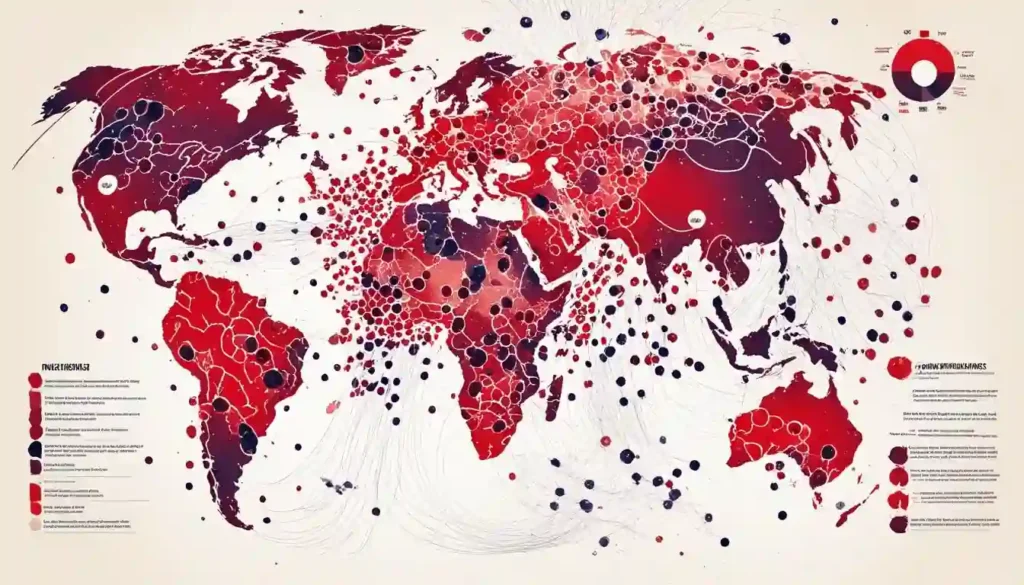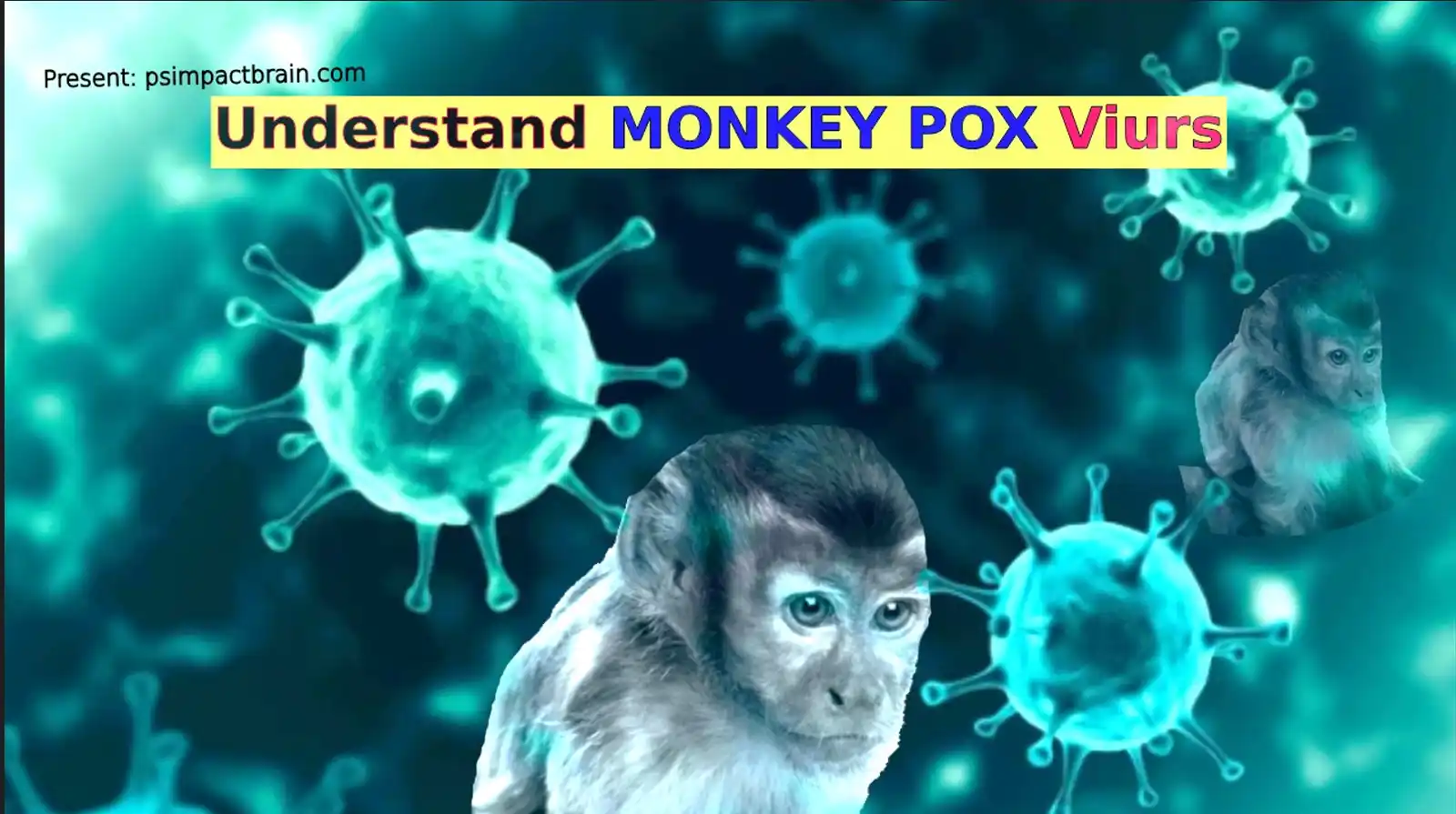Can monkeypox Virus be declared a public health emergency?
Understand before MONKEYPOX or MPOX declared as public health emergency.
The world is still dealing with the COVID-19 pandemic’s aftermath. Now, a new threat, monkeypox, has appeared globally. It’s spreading fast, making people wonder if it could be the next big health crisis. The big question is: should the World Health Organization declare monkeypox a global health emergency?
This article will look into the monkeypox outbreak, how it spreads, and what makes declaring it a health emergency a possibility. We’ll see how the world is reacting, the WHO’s role, and healthcare’s readiness. We’ll also talk about vaccines, public awareness, and the economic and social effects of a Mpox pandemic.
- The monkeypox virus could become a worldwide health crisis, with cases rising quickly in many countries.
- How the virus spreads, its severity and treatment and vaccine availability will help decide if it’s a health emergency.
- The World Health Organization is key in tracking the outbreak, offering advice, and leading the global response.
- Having enough vaccines and making sure they’re shared fairly, along with raising public awareness and prevention, are crucial to stop Mpox.
- Learning from past outbreaks can help us deal with monkeypox now and prepare for future diseases.
At the same time, we should ensure that socially we do not lose our patience on any upcoming illness and keep giving good suggestions and good ideas to people around us regularly, this is the identity of a good citizen.
Lat’s Understanding the Monkeypox Outbreak
The recent monkeypox outbreak has caused worldwide concern. Let’s look into the basics of the monkeypox virus and how it spreads. We’ll also cover the typical symptoms of the disease.
What is Monkeypox?
Monkeypox is a rare viral infection caused by the Mpox virus. It belongs to the Ortho poxvirus genus. Before now, it was mainly found in Central and West Africa. But now, cases are reported in many countries around the world.
Transmission and Symptoms
The virus spreads through close contact with infected people, their droplets, or contaminated items. Symptoms include fever, headache, muscle and back pain, swollen lymph nodes, chills, and a unique skin rash. This rash starts on the face, arms, or legs and can spread.
It’s key to know that this outbreak might be different from past ones. Govt. Health experts ongoing data to fully understand the situation.

“Monkeypox is a serious disease, but the current risk to the general public is low. However, we must remain vigilant and follow the guidance of public health authorities to contain the spread of the virus.”
| Symptom | Frequency |
|---|---|
| Fever | 90% |
| Headache | 80% |
| Muscle Aches | 70% |
| Backache | 60% |
| Swollen Lymph Nodes | 50% |
| Chills | 40% |
| Skin Rash | 100% |
Can monkeypox be declared a public health emergency
The monkeypox outbreak is spreading worldwide, making people wonder: Can this virus be seen as a public health emergency? We need to look at how severe, widespread, and impactful the outbreak is.
The World Health Organization (WHO) guidelines say a public health emergency is declared when an event threatens public health globally. This happens when the illness is serious, could spread across borders, and the world’s response is not enough.
Now, monkeypox/Mpox cases are found in many countries, not just in Africa where it’s usually found. This situation is considered a global health emergency. Health experts are watching closely to see if it needs a formal declaration.
Deciding if monkeypox is a public health emergency involves looking at several things, such as:
- The rate of transmission and the ability to contain the virus
- The severity of the illness and the risk of serious complications
- The availability and distribution of effective vaccines and treatments
- The capacity of healthcare systems to manage the influx of cases
As we watch how the world reacts to monkeypox, it’s unclear if it will meet the criteria for a public health emergency. The WHO will be key in checking the situation and advising on what to do next.
Examining the Global Spread
The recent monkeypox outbreak has caught the world’s attention. It’s spreading fast across many regions. The data shows a worrying trend, with cases going up and reaching different parts of the globe.
Reported Cases and Affected Regions
Now, the monkeypox outbreak is in over 60 countries around the world. The United States is one of the hardest hit, with over 3,000 cases reported. The Centers for Disease Control and Prevention (CDC) has confirmed this.
Other countries like the United Kingdom, Spain, Germany, France, and Canada are also seeing a lot of cases. Africa, where the virus is common, is reporting more cases too. how widespread the issue is.
| Region | Reported Cases |
|---|---|
| United States | 3,487 |
| United Kingdom | 1,856 |
| Spain | 1,546 |
| Germany | 1,242 |
| France | 977 |
| Canada | 681 |
* The data can vary in duration past.
As the situation with monkeypox gets worse, governments and health experts are watching closely. They’re taking steps to stop the spread and keep people safe.

The World Health Organization (WHO) is key in handling global health crises, like the monkeypox outbreak. It’s the top health body worldwide. The WHO tracks infectious diseases and gives important advice to countries and health systems everywhere.
One of the WHO’s main jobs is to see how serious a disease outbreak is. It decides if it’s a “Public Health Emergency of International Concern” (PHEIC). If it is, it starts a global action plan, sharing info and medical help.
For monkeypox, the WHO is watching the situation closely. It’s checking if the outbreak should be called a PHEIC. This decision is big for stopping the disease, using resources, and working together worldwide.
“The WHO’s role is to provide leadership, coordinate international efforts, and ensure a coherent, evidence-based response to contain the spread of monkeypox and mitigate its impact on public health.”
The WHO has Monkeypox Surveillance, Case Investigation and Contact Tracing guidelines. These include:
- Strengthening disease surveillance and reporting systems
- Doing timely case investigations and tracing contacts
- Using effective infection prevention and control steps
- Ensuring everyone has access to tests, treatments, and vaccines
- Talking with affected communities to spread awareness and address worries
The WHO’s leadership is key in guiding a strong, science-based response to monkeypox. This will help the global health community tackle this public health issue together.
Assessing the Risk Factors
The monkeypox outbreak is growing, and it’s key to look at the risks. Being near someone who is infected or touching things they touched are big risks. People who work in healthcare or live with the sick are more likely to get the virus.
Vulnerable Populations
Some groups are more at risk of getting monkeypox. This includes people with weak immune systems, like those with HIV/AIDS or cancer. Kids, who have less strong immune systems, are also at risk. Plus, those with skin issues or who are pregnant might be more likely to get sick.
Healthcare System Preparedness
How ready the healthcare system is to deal with monkeypox cases is very important. Having enough PPE, tests, and treatments is key. Healthcare workers need to know how to spot, manage, and stop the spread of monkeypox. Good disease prevention and control in healthcare is key to stopping the virus.
| Risk Factor | Description |
|---|---|
| Close Contact | Being near someone who is sick or touching things they touched increases your risk of getting the virus. |
| Weakened Immune System | Those with weaker immune systems, like people with HIV/AIDS or cancer, are more likely to get monkeypox. |
| Skin Conditions | People with skin issues may be more at risk from the monkeypox virus. |
| Pregnancy | Women who are pregnant may face a higher risk of complications from monkeypox. |
| Healthcare Preparedness | How well healthcare can handle more cases, including having PPE, tests, and treatments, is very important. |
Knowing the risks helps health experts and healthcare workers plan better. This way, they can protect those most at risk and keep the healthcare system strong.
Vaccine Availability and Distribution
The monkeypox outbreak is growing, making vaccines key to stopping it. Having enough vaccines is vital for healthcare readiness. It helps in preventing the disease and keeping at-risk groups safe.
Several vaccine candidates are now approved for monkeypox, detail regarding vaccine can see at WHO website. But there’s not enough vaccine for everyone, especially in places with few health resources.
Health officials are working hard to increase vaccine availability. They’re focusing on giving vaccines to those most at risk first. They’re also making distribution smoother and working with other countries.
Keeping up with healthcare preparedness is key as things change. Making sure everyone has access to vaccines is crucial. This will help fight the monkeypox outbreak and keep communities safe.
Public Awareness and Prevention Strategies
Stopping the monkeypox outbreak needs a strong plan. We must focus on public awareness and community actions. Teaching people about the disease, how it spreads, and how to prevent it is key. This helps people protect themselves and their families.
Educating Communities
We need to reach out to different groups with clear, correct info. This helps clear up wrong ideas, lowers fear, and gets people to take steps to prevent the disease. It’s important to teach the public about monkeypox signs, how it spreads, and why to see a doctor if needed.
- Use local media, community centers, and trusted leaders to spread the word.
- Make educational materials available in many languages.
- Emphasize the need for good hygiene, like washing hands often and avoiding close contact with infected people.
- Tell people to keep up with health advice from experts.
By giving communities the knowledge and steps they can take, we can build a culture of prevention. This helps stop monkeypox from spreading and keeps people healthy.
“Educating communities is a critical component in our fight against monkeypox. By equipping individuals with the right information, we can empower them to make informed decisions and take proactive measures to safeguard their health and the health of their communities.”
Lessons from Past Outbreaks
As we deal with the monkeypox outbreak, it’s key to look back at past disease outbreaks (Mpox infection has been prevalent since 1970) By seeing how the public health community acted before, we can get ready and lessen the effects of this new health issue.
One big lesson is the need for early and proactive disease prevention strategies. Countries that acted fast during the COVID-19 pandemic, like setting lockdowns and limiting travel, did better at stopping the virus. Also, being ready in healthcare, like having enough PPE and tracing contacts, is very important.
- Rapid implementation of public health measures: Lockdowns, travel restrictions, and widespread testing proved effective in past outbreaks.
- Robust healthcare preparedness: Ensuring availability of PPE, hospital capacity, and efficient contact tracing are crucial.
- Effective risk communication: Transparent, science-based messaging can help alleviate public concerns and promote compliance with safety guidelines.
Another key lesson is the importance of effective risk communication and public education. Clear and science-based messages from health officials helped calm people and make them follow safety rules in the past. This kind of communication is key to gaining trust and keeping the public informed and involved in stopping diseases.
“The lessons learned from past outbreaks serve as a roadmap for navigating the current monkeypox situation and strengthening our overall healthcare preparedness.”
As we face the monkeypox outbreak, we must use the lessons from past public health crises. By using these insights, we can make our disease prevention plans better, get healthcare ready, and talk about risks well. These steps will help us deal with this new health challenge better.
Economic and Social Impacts
The monkeypox outbreak could affect many parts of our society. It could hit the economy and social well-being hard. Understanding and tackling the wide effects it might have is key.
Economic Impact
The economic effects of monkeypox could be big. Businesses might see disruptions, with workers needing time off for treatment or quarantine. This could mean less work done, less money made, and problems with getting supplies.
Also, the healthcare system could get overwhelmed. This would take resources away from other important services. It would put a big financial load on people and the economy.
Social Impact
Monkeypox also has big social effects. Groups with less access to healthcare or facing stigma could be hit hard. Being isolated and away from others can make people feel lonely and worsen mental health, especially for those already struggling.
To deal with the economic impact and social impact of monkeypox, we need a strong plan. Leaders, healthcare workers, and community figures must work together. They should make sure the most vulnerable people aren’t hit too hard. Disease prevention efforts and support systems are key to lessening the long-term effects of this crisis.
“The true measure of any society can be found in how it treats its most vulnerable members.”
By focusing on the needs of those most affected and building solidarity, we can get through this. We’ll come out stronger, more united, and ready for future health crises.
Collaborative Efforts in Disease Control
Fighting a global health crisis like monkeypox needs a team effort across the world. Diseases don’t stop at borders, showing why international cooperation is key for controlling and preventing them.
International Cooperation
Sharing info, resources, and best practices is crucial for disease control. Through international cooperation, the world can use its knowledge and resources together. This helps create a strong plan to fight the monkeypox outbreak.
- Coordinating surveillance and data-sharing to track the spread of the virus
- Collaborating on the development and distribution of vaccines and treatments
- Establishing joint protocols for outbreak response and management
- Promoting cross-border communication and coordination among healthcare systems
- Ensuring equitable access to essential medical supplies and services
By working together globally, we can lessen the effects of this global health emergency. This helps protect people’s health all over the world.
“Collective action and international cooperation are essential in addressing the monkeypox outbreak and ensuring the health and safety of communities around the world.”
Ethical Considerations and Human Rights
As we face the monkeypox outbreak, we must think about its ethical sides. We need to respect everyone’s human rights. The way we handle this health crisis should be fair, just, and respect everyone’s dignity.
First, making sure everyone can get tests, treatments, and ways to prevent the disease is key. We can’t let differences in wealth, race, or where people live stop us. If some groups don’t get the same healthcare, it makes things worse for them.
We need to make sure our plans help everyone, especially those who are often left behind. This means looking closely at what each group needs and trying to remove the obstacles they face.
Also, keeping people’s health information private and stopping discrimination is very important. People with monkeypox shouldn’t be shunned or judged. This can make them not want to get help, which makes the problem worse. We need strong rules to protect everyone’s health info and fight against unfair treatment.
FAQ
What is monkeypox, and how is it transmitted?
Monkeypox is a viral disease that spreads through close contact with infected people or objects. It can spread through skin contact, breathing in droplets, or touching infected surfaces.
Can monkeypox be declared a public health emergency?
Yes, the World Health Organization (WHO) can declare monkeypox a Public Health Emergency of International Concern (PHEIC). This happens if the outbreak is severe and could spread across borders.
What are the symptoms of monkeypox?
Symptoms include fever, headache, muscle and back pain, swollen lymph nodes, chills, and a rash. This rash often appears on the face, arms, legs, and other body parts.
Where has the monkeypox virus been reported?
Cases of monkeypox have been found in many countries in Europe, North America, and other areas. It’s spreading beyond its usual areas in Central and West Africa.
What is the role of the World Health Organization (WHO) in the monkeypox outbreak?
The WHO is watching the Mpox situation closely. It gives advice to countries and helps with global efforts to stop the virus. The WHO might declare a Public Health Emergency of International Concern if needed.
Who is most at risk of contracting monkeypox?
Some people are more likely to get monkeypox. This includes those with weak immune systems, close contacts of infected people, and healthcare workers at risk of exposure.
Are there vaccines available for monkeypox?
Yes, vaccines like the smallpox vaccine work against Mpox. But, these vaccines are not widely available yet in many places.
How can the public help prevent the spread of monkeypox?
Being aware and educated is key to stopping monkeypox. People can help by keeping clean, avoiding close contact with those possibly exposed, and getting medical help if they show symptoms.
What lessons can be learned from past disease outbreaks to improve the response to monkeypox?
Past outbreaks like COVID-19 teach us a lot. They show us how to get healthcare ready, work together internationally, and make better health strategies for diseases like Mpox.
What are the potential economic and social impacts of the Mpox outbreak?
Monkeypox could affect the economy, healthcare, and hit vulnerable communities hard. We need a wide, fair, and caring plan to lessen these effects. Read extra detail about Monkeypox
Read Also…..
H5N1 virus is also affecting humans in a similar way, to know this, read the article once.
